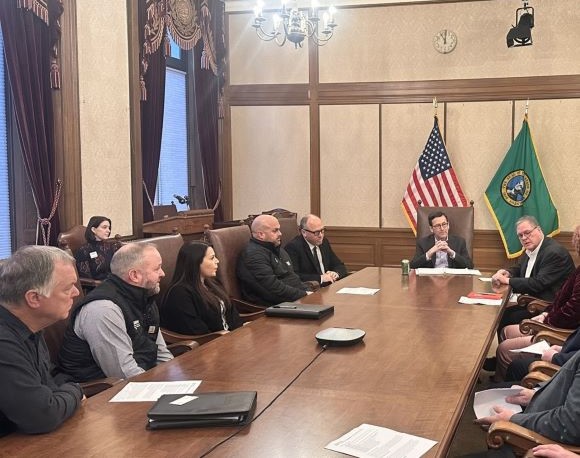May 12, 2025
The legislative session began this year with the majority party promising to address the housing crisis by passing bills to increase the housing supply. Unfortunately, the gap between political rhetoric and reality couldn’t be more apparent.
While some lawmakers are calling this session another “Year of Housing,” BIAW disagrees. While some minor reforms may help spur a few new housing starts, the legislature did more harm than good to private sector homebuilding. As such, this year's housing winners were government-subsidized affordable housing developers; think nonprofits and public housing agencies.
The government-backed industry segment will always have a place in the housing ecosystem. That said, our state cannot afford to build its way out of the housing crisis, at least not without private development. Let’s face it: subsidized housing relies on the success of a healthy private homebuilding presence, as our members pay fees and taxes (some bookmarked for government-backed building) at each stage of the homebuilding process. The blatant refusal to address rising building costs doesn’t help subsidized housing build more units with your tax dollars, nor allows the free market to provide cost-effective homes for Washington families.
Let’s break down the good, the bad, and the ugly of this session—and what it all means for the builders to keep up with demand, stay in business, pay their employees livable wages, and build the communities in which they live.
The Good – Minor Victories Passed
- HB 1096 by Rep. Barkis passed the finish line this year. This legislation will allow property owners to administratively split their lot once (if certain requirements are met) and sell to add light-density housing types in existing neighborhoods.
- SB 5559 by Sen. Lovelett is a complementary policy to HB 1096, as it essentially allows the same lot splitting to occur at the development level.
- HB 1403 by Rep. Taylor allows condo developments with 12 or fewer units (and no more than three stories) to offer a 2-10 Homebuyers Warranty instead of being bound to the statutory implied warranty provisions currently killing the viability of condo development.
- SB 5148 by Sen. Bateman is dubbed the Housing Accountability Act. If cities and counties don’t meet the housing goals outlined in their comprehensive plans, they may lose eligibility for infrastructure funding from the state.
- SB 5611 by Sen. Salomon improves the utilization of a binding site plan for multi-family residential projects, saving members the hassle (and expense) of going through the subdivision process. Perhaps more importantly, this legislation makes it illegal for a jurisdiction to make you waive your right to a speedy permit review as authorized in SB 5290 (unless substantiated and agreed upon in writing by both parties).
- SB 5184 by Sen. Bateman aims to reform parking mandates by prohibiting cities and counties from requiring more than half a parking space per residential dwelling unit and off-street parking as a condition of project approval.
- HB 1576 by Rep. Walen places restrictions on designating historical landmarks. Before this legislation, your neighbor could establish your home (or property) as a historical landmark without your knowledge or permission. Seattle has at least 60 examples of predatory landmarking to stop housing growth.
- HB 1414 by Rep. Connors directs the state career and technical education task force to recommend changes to improve training, certification, and employment opportunities for 16- and 17-year-olds in career and technical education programs.
- SB 5408 by Sen. King aims to reduce frivolous lawsuits over nondisclosure of wage and salary information in job postings. The legislation allows employers to correct non-compliant postings before enforcement actions are taken and exempts job postings on third-party services that are published without the employer’s consent.
The Bad: Bad for Business or Missed Opportunities
- HB 1491 by Rep. Reed is a missed opportunity for transit-oriented development projects. The requirements stipulate that 10% of all units must be affordable, another 10% must be workforce housing (if 10% of all units have 2+ bedrooms), or 20% must be dedicated to workforce housing. While the legislation allows a reduction in impact fees with a 20-year Multi-Family Property Tax Exemption (MFTE), BIAW’s assessment remains that the affordability requirements will render this program underutilized.
- HB 1494 by Rep. Ramel is another missed opportunity. It expands the MFTE program to any city with a population of 15,000 if mandatory inclusionary zoning is required. Counties with an unincorporated population of at least 170,000 can also offer MFTE, but only if they have a campus of higher education with on-campus housing or are in Clark, Kitsap, or Snohomish Counties, where projects are located a half mile from a transit station.
- HB 1308 by Rep. Reed is bad for business as it requires employers to provide an employee or former employee with their personnel file within 21 days of a request. If not provided, the bill authorizes a private cause of action, thus making it easier for employers to be sued.
- HB 1788 by Rep. Richards will increase workers' compensation costs for employers and employees because the legislation expands benefits based on marriage status and household size.
- HB 1213 by Rep. Berry eliminates small business protections in the state’s Paid Family Medical Leave (PFML) program, resulting in devastating effects for small employers over the next three years. By January 1, 2028, employers with eight or more employees must offer PFML benefits.
- SB 5041 by Sen. Riccelli grants unemployment benefits to striking workers. Initially, the bill included coverage for strikes lasting 12 weeks. Through negotiations, the coverage was revised to allow for six weeks of benefits with an extended waiting period before a claim can be filed.
The Ugly – Taxes for EVERYONE
The building industry left the tax battle relatively unscathed compared to other sectors. Still, the consequences of even minor tax increases can devastate builder confidence, housing starts, company profitability, and the cost of household goods.
- HB 2081 by Rep. Fitzgibbon permanently increases the Business and Occupation Tax (B&O) to 0.5% of gross revenues. Any company with $250 million in annual revenue also received a 3-year surcharge of 0.5%, beginning January 1, 2026. While the surcharge won’t necessarily hit our builder members, it will continue to increase the costs of construction and household goods because retailers, wholesalers, and other segments of the construction supply chain will be impacted.
- SB 5814 by Sen. Frame expands the retail sales tax to previously exempt services such as IT, advertising, security, and temporary staffing. Expect these business costs to increase as the changes to the tax code begin to take effect.
- SB 5813 by Sen. Claire Wilson modifies the structure and rates of capital gains and estate taxes. For example, the capital gains tax must be paid on gains between $270,000 and $1 million at a rate of 7% and 9.9% on $1 million or more. Our members should contact their financial planners to ensure their business succession and retirement plans are still on track.
- SB 5794 by Sen. Salomon repeals tax preferences that the Department of Revenue cites as underutilized or no longer relevant. Costs will likely increase for insurance, title insurance (thus increasing costs for homebuyers), banking, and self-storage.
- SB 5161 by Sen. Liias will increase the gas tax by 6 cents for gasoline and 9 cents for diesel and automatically increase with inflation at a rate of up to 2 percent. Additionally, vehicle-related transaction fees such as registration, identification cards, tires, and car rentals will increase.
- HB 2049 by Rep. Bergquist initially sought to increase the property tax cap from 1% to 3%. After record-breaking levels of citizen opposition, the legislation was pared down to allow more funding at the local level. This will enable more affluent areas to pay more via property taxes to support their districts, while poor districts are left behind. Sounds equitable, doesn’t it?
The Ugliest – Rent Control
HB 1217 is surrounded by controversy, as former Representative Alvarado introduced the legislation in the House of Representatives and then was appointed to the Senate to fill a vacancy. Further controversy surrounds the lawmaker’s employer, her role as a legislator, and potential ethical violations. It’s worth a Google search.
Turning to the legislation, HB 1217 originally proposed a 7% cap on rent increases for residential rentals. However, after a series of amendments passed through the Senate and some procedural drama unfolded, we were ultimately left with a final version that included annual rent increases of 7 %+ Consumer Price Index with a 10% absolute cap. There is a 12-year exemption for newly constructed units, and a sunset of the policy in 15 years, unless extended by the legislature. Mobile home housing providers are the biggest losers as their annual rent increase cannot surpass 5%.
The legislation also makes changes to the notice provisions and fees that residential housing providers can charge:
- Maximum rent increases require at least 120 days’ notice, whereas all other lower rates of rent increases require 90 days’ notice.
- Limits security deposits to one month’s rent.
- Removes the ability to charge move-in fees.
- Tenants can break the lease agreement with 30 days’ notice for month-to-month tenancies and 45 days for fixed-term tenancies. No fees may be assessed for termination.
Rest in Peace (For Now) – Bills Coming Back Next Year
- SB 5360 by Senator Trudeau thankfully died this year, as it would’ve created a new regime for environmental crimes. The bill would’ve established new crimes and higher penalties that would’ve made crimes against the environment more severe than most violent crimes.
- HB 1254 by Rep. Duerr would’ve undone the compromise from last year between firefighters, builders, and the environmentalists. If passed, the bill would’ve given the State Building Code Council full authority to enact all provisions of the costly Wildland Urban Interface Code (WUI). Full implementation would increase new construction costs and send the wrong signals to an already weak insurance market, threatening coverage options for Washingtonians.
- HB 1303 by Rep. Mena would’ve placed a heavier emphasis on environmental justice in the State Environmental Policy Act (SEPA), basically undoing all the improvements made in recent years to streamline this segment of permitting. While residential construction had an exemption, the bill's overall impact would’ve stopped economic development, limiting livable-wage employment prospects for Washingtonians.
- SB 5109 by Sen. Kauffman would’ve increased the Deed of Trust fee from $1 to $5 to fund more prosecutions of mortgage fraud. According to members, Washington already has one of the most robust operations for prosecuting mortgage fraud. BIAW was pleased to see this bill die this year.
- HB 1015 is another doozy by Rep. Duerr. This bill would’ve required jurisdictions to require sellers to obtain an energy audit at the point of sale. The bill could’ve devastated sellers with older homes, many relying on their home equity to fund their retirement.
Overall, the legislative session was filled with mixed signals about whether the state is serious about solving our housing supply crisis. Case in point: Governor Ferguson vetoed HB 1108 by industry ally Rep. Klicker. The bill would’ve studied the primary cost drivers for producing new housing units – think Growth Management Act, Energy Code, and other Washington-specific regulations. We’re told the veto is a result of budgetary constraints of this biennium, despite the governor signing $9 billion in new revenue (AKA taxes). Interestingly, HB 1108 has a fiscal note of less than $234k, whereas HB 1516 by Rep. Hill (a study of insurance options for permanently affordable homeownership units) is estimated to cost $370k.
ENRAGED? GET ENGAGED
Sign up for advocacy alerts!








